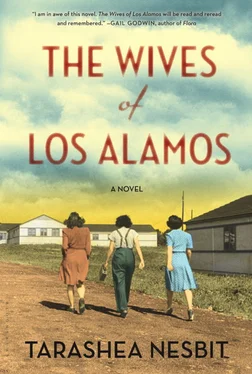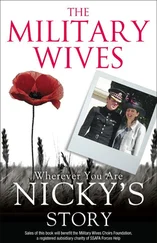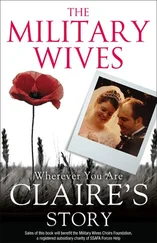THERE WAS NEVER any quiet; our bathroom doors did not lock, our children came in asking, When am I going to be old enough to carry someone on my back? And When can I climb on the roof ? And When can we go see Grandma? And the older ones asked: Why can’t I stay at Madeline’s tonight? Why can’t I go to the dance? When can I shave my legs? What is Dad working on?
OUR BOYS STARTED growing tall and saying No and meaning it. They were bored, too, but differently.
OUR CHILDREN TALKED back to us in Spanish slang they learned from the carpenter’s children, or the Tewa they learned from our maids and we did not understand, though we were pretty sure we were being insulted.
WE HOSTED PARTIES for the teenagers of the town, mostly the children of other people—the carpenters, the cooks—and we taught the boys to dance as a way, we thought, to keep them out of trouble. And if our own sons and daughters weren’t teenagers they began the dance of hitting and punching one another, no longer knowing what to do with their affections—their bodies growing into shapes foreign to them. Their voices, when they addressed us, were frequently close to shouting.
SOME OF US were older and had boys who did not smile, and they wanted to be kissed, but not by us, and there were only ten girls in their class to choose from, they said, because the Mexican girls, black girls, and Indian girls did not count. Some of us disagreed. But many girls were not interested in our boys; instead, they folded their skirts over at the waist to make the hem shorter for when a soldier walked by, and they tried out new smiles they learned about in our women’s magazines. A few of our daughters didn’t seem to be thinking about these things at all and instead brought home posters that said wipe that Jap off the map and when we asked where they got it our daughters said, The post office gave it to me , and they taped it to the ceilings above their beds.
WE WERE WASHING dishes and we saw the overflowing trash can, or a child came in asking for milk, and we were reminded of something significant: we could never be separated from our children or our husbands, entirely. At times we heard the rise of our husbands’ voices lovingly in our heads, when they were away at the Tech Area for what felt like weeks, coming home only to eat dinner, and we felt as if we were widows. We would be alone hanging curtains and look back at our well-sewn, well-hung yellow drapes and hear them say, You’re an ace, Mary , and recall fondly, or sadly, their voices.
THERE WERE OTHER problems. Some of our husbands would not let us sleep until we made love, and we were tired but it was easier to turn toward them than to feign sleeping, so we turned toward them. Sometimes in those moments we left our bodies for a few minutes, making love as if we were in another room, and we watched ourselves, distantly, and then they snored, and then, finally, we got some sleep.
OR OUR HUSBANDS still came up behind us in the kitchen and delighted us with their bodies and we turned around. Our children were in bed, were outside playing, were staying the night at a friend’s house. We pushed into our husbands, we pulled them in, we moved their hands up our skirts.
OR WE BECAME more like roommates or friends than lovers. We cuddled, and that was all. Or we did all of the above, at different intervals, in different arrangements, for years.
ON WEEKENDS WE would take hikes with them. They talked and talked about the war and Germany but their voices were sometimes lost in the rush of the river. We enjoyed nature’s sounds taking over theirs, and we let them talk, and saved our own breath for the ascent back up the canyon. Sometimes between the canyon walls, we made echoes of our own raised voices. You always. I never. I can’t believe. You. You. You. Perhaps we were frustrated by the heat, were dehydrated, or were tired; we blamed our fight on the wind or the water, on a bad night’s sleep, on our frustration with the children. But it was this: We could not leave . Or it was this: We feared the enemy was getting closer .
A FEW OF our husbands read How to Win Friends and Influence People and offered to pay us a dime for every time they broke one of the rules, such as Never tell someone they are wrong directly , and Start with questions to which the other person will answer yes . We said we did not want to help because we did not want this persuasion directed at us. Although maybe there were things to appreciate: Don’t criticize and Pay little attentions .
SOMETIMES SPREADING TIME with our husbands and one another brought out the worst in us. And occasionally the best. From time to time we said Why certainly and we felt Of course not. Sometimes we felt so familiar, too familiar, and our own words frightened us when they came from our mouths, as did the actions of our hands: it is those we are closest to that we can harm the most. And occasionally, during a fight, we were quiet, and we waited out the silence until our husbands could no longer stand it.
OCCASIONALLY THIS TECHNIQUE did not work; our husbands could go without speaking, in the humming uncomfortable for days. We lost, and we showed them how we needed them more than they needed us. Some of us had parents who lived for decades at this low simmer, some of us had parents who might, on a good day, a holiday, say, or for the birth of a grandchild, finally play a loving tune on top of that hum, but they never, ever, forgot the solemn chord.
WE HEARD MOTHERS scream at their sons, we saw four-year-old boys walk out into the street and we saw fathers throw them against the house as punishment. We watched the windows shake. We saw children sobbing in front yards and hated what we saw, but we did nothing except talk about it. Our children watched this too and said, Poor Michael , and cried. Our children picked up new phrases from these violent observations, or from these children, such as What’s eating you? Those parents worked with their hands, and we felt safer knowing they were not one of us. Or we thought they were like us and we felt cowardly for not doing anything.
THEIR CHILDREN GOT in lots of fights. Their children were picked on, their children made wooden guns and wanted to be just like the soldiers. We did not know our children called their children Okie and hillbilly , or we did notice because, when we were angry that the garbage truck did not come all week, or that they let their children run wild, some of us said these names, too.
THE OLDER CHILDREN were children of machinists, construction workers, and secretaries. We sensed that they missed the activities found in other towns—team sports, cheerleading, band—and we feared them and their boredom. We were anxious about the boys’ fascination with all things Army; we let the girls babysit our children, hoping they would read the New Yorker s left lying around or explore our classical record collection. The carpenters’ daughters were just as smart as our daughters, and they got scholarships to college, and they went. Or they were afraid of leaving their family, what was familiar to them, and they married GIs instead.
AND WHEN OTHER men spanked our children for climbing on their swing sets we fumed and related the story to our husbands, who said we needed to relax. We were angry about the lack of social services, especially when our children reported dreams of that bad man who spanked them, because particularly then we felt helpless. The military police had been called on these men several times, but these fathers said, No, I didn’t do that , and the MPs just went away.
Читать дальше












